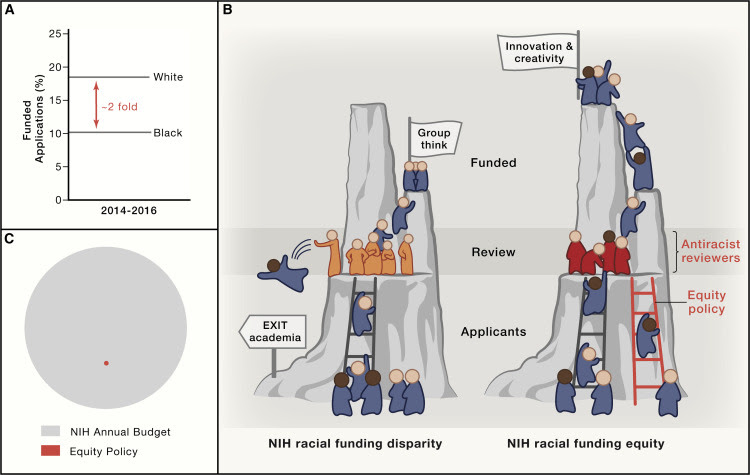SFB Members Call to End NIH Funding Disparity and #FundBlackScientists
SFB Members Call to End NIH Funding Disparity and #FundBlackScientists
Recently, a nationwide network of BME women faculty, including several Society For Biomaterials (SFB) leaders and members like our President, Shelly Sakiyama-Elbert, and our Secretary/Treasurer, Elizabeth Cosgriff-Hernandez, published a commentary in Cell describing stark disparities in NIH research funding that have created a barrier to the success of Black scientists. For the past decade, the Black applicant award rates for NIH research funding has been approximately half the rate of similarly trained white investigators. Given that NIH funding is often used in promotion and tenure decisions, this racial disparity in research NIH funding leads to failed tenure cases for Black faculty. Beyond promotion, there is also a high risk of burn out and exit from the academy before reaching the tenure threshold due to the increased burden of twice as much proposal writing to achieve the same funding level as white PIs. This excessive proposal writing burden on top of substantially more service leaves Black faculty less time to do research, publish papers, gain exposure, and train and inspire diverse students. The loss of Black scientists from the academy and limiting the scientific achievement and career trajectory of those that remain has removed much needed perspectives, creativity, and knowledge of diverse populations from healthcare research. The loss of Black faculty members in the classroom limits our ability to effectively retain and train the next generation of Black scientists. The authors provide a set of NIH policy recommendations in the article to eliminate the funding disparity, as well as action items for fellow scientists, the private sector, and academia to overcome the racism that is endemic in the sciences.
• Explicitly state that racism persists in the United States research enterprise and that it must be expelled.
• Institute policies to immediately achieve racial funding equity
• Make diversity score-driving criteria, prioritize diverse teams for funding, and diversify review panels
• Train and empower NIH leadership, staff, and grant reviewers and recipients to recognize and stop racism
Link to Full Article: https://www.cell.com/cell/fulltext/S0092-8674(21)00011-8

This article was published in Cell, Vol 184, Kelly R.Stevens, Kristyn S.Masters, P.I. Imoukhuede, Karmella A.Haynes, Lori A.Setton, Elizabeth Cosgriff-Hernandez, Muyinatu A. Lediju Bell, Padmini Rangamani, Shelly E. Sakiyama-Elbert, Stacey D.Finley, Rebecca K.Willits, Abigail N. Koppes, Naomi C. Chesler, Karen L. Christman, Josephine B.Allen, Joyce Y.Wong, Hana El-Samad, Tejal A.Desai, Omolola Eniola-Adefeso, Fund Black Scientists, 561-565, Copyright Elsevier (2021).

